News
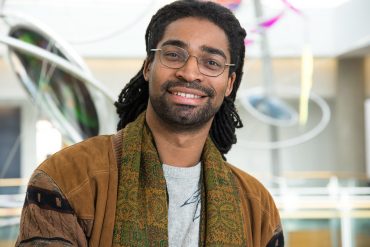
March 30, 2021
Ph.D. botanist inspired to start African American scientists series
Shawn Abrahams | photo by Roger Meissen, Bond LSC By Becca Wolf | Bond LSC Last summer was emotional for many people throughout the country. Movements like Black Lives Matter led many to reflect of the role race plays in society, and to act. Scientists like Shawn Abrahams used that as inspiration to look more closely at what career options are available for botanists, paleobotanists, and plant scientists outside of research. Abrahams felt compelled to capitalize on that energy and inspire fellow minorities. “There’s a rich history of black people being involved in botany and plant taxonomy that…
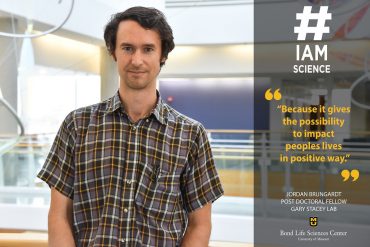
March 26, 2021
#IAmScience Jordan Brungardt
By Becca Wolf | Bond LSC When one hears of a magician, they think of a man that pulls a rabbit out of a top hat or ‘cuts’ people in half. Magicians have a lot of tricks up their sleeve. People do not think of scientists as magicians, yet they still perform wonderous things. “I heard a quote one time that says science and technology is kind of like magic,” Jordan Brungardt said. “For somebody that doesn’t know what is happening, experiments look like magic if they’re performed well. Think of cell phones allowing us to talk to…
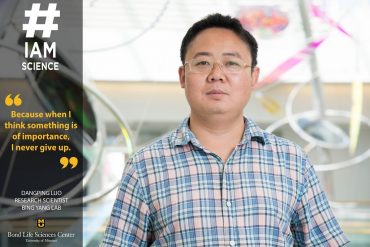
March 19, 2021
#IAmScience Dangping Luo
By Lauren Hines | Bond LSC The greenhouse isn’t a place most researchers linger. With condensation sticking to the glass windows, scientists usually don’t dawdle longer than 30 minutes in the heat and humidity. But Dangping Luo, on the other hand, doesn’t seem to mind and takes his time tending to his rice plants. A research scientist in the Bing Yang lab at Bond Life Sciences Center, Luo, is a man of determination and conviction. For the past 18 years, Luo has been studying rice genetics and its interaction with disease. “When I think something is of…
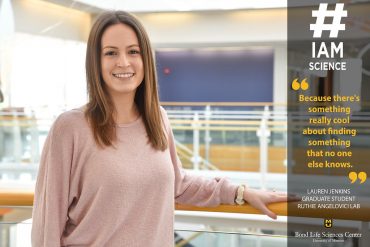
March 12, 2021
#IAmScience Lauren Jenkins
By Becca Wolf | Bond LSC As someone interested in getting a Ph.D., you apply to several schools and programs hoping to get in. When Lauren Jenkins first interviewed with Mizzou, she knew it was the one. But the interview was not the first time she’s had a good impression with the school. As an undergraduate student at the University of Missouri-St. Louis, Jenkins’ first science conference was the Interdisciplinary Plant Group (IPG) Seminar at the Bond Life Sciences Center. “I actually had the opportunity to give a talk there,” Jenkins said. “I just remember being an undergrad…
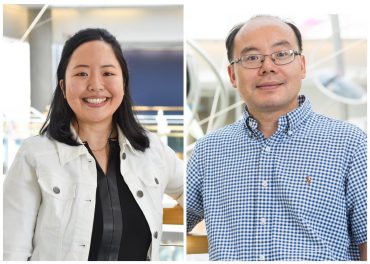
March 10, 2021
Higher Viral Load May Lead to Less Severe Symptoms
Cynthia Tang and Henry Wan | photos by Becca Wolf and Roger Meissen, Bond LSC By Becca Wolf | Bond LSC You would think that the less sick you are, the less contagious you are. That’s just logic. However, science isn’t always logical. Especially with Covid-19. Henry Wan, principal investigator at Bond Life Sciences Center, recently found that when a person has mild symptoms of Covid-19 they have a higher amount of viral shedding. He also found that people with a higher amount of virus on their positive swab test are less likely to be hospitalized than those…
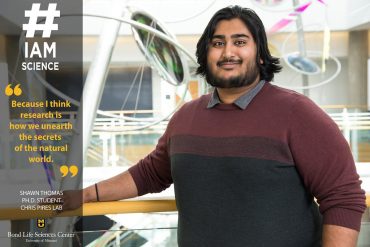
March 5, 2021
#IAmScience Shawn Thomas
By Lauren Hines | Bond LSC Social media botany advocate and self-proclaimed coffee snob, Shawn Thomas is the kind of person to find joy in everything. Thomas graduated from the University of Georgia in spring 2018 and worked as a bioinformatics technician for a year with Jim Leebens-Mack before joining Chris Pires’ lab at Bond Life Sciences Center as a Ph.D. student in fall 2019. Ever since, he’s been studying how genome duplications affect plant traits in a certain group of plants that include broccoli, cauliflower and kale. Genome duplications occur when DNA is…
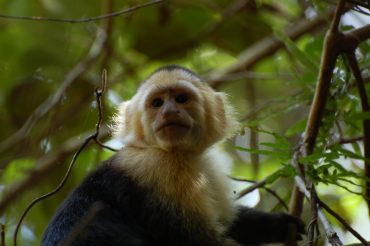
March 2, 2021
Genetic link in primate points to source of adaption and longevity in capuchins
As part of an international collaboration, principal investigator Wes Warren helped study capuchins in Costa Rica. | Photo contributed by Amanda D Melin, Bond LSC. By Lauren Hines | Bond LSC Through monkey poop and three years of work researchers from all over the world sequenced the Panamanian white-faced capuchin genome for the first time and devised novel methods to sequence many more wild capuchin genomes. These monkeys have large brains for their small size and can live past 50. Wes Warren — Bond Life Sciences Center principal investigator — helped sequence the genome to find…
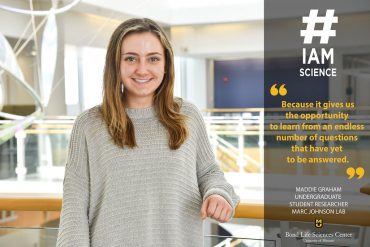
Feb. 26, 2021
#IAmScience Maddie Graham
By Becca Wolf | Bond LSC When the pandemic hit, Maddie Graham’s lab life shifted focus. The junior biomedical engineering pre-med student suddenly started to find answers by extracting RNA out of wastewater to help detect SARS-CoV-2, the virus that causes Covid-19, which reiterated how important science is in our lives. “I don’t think medicine would be anything without research,” Graham said. “I think it’s really important to see the other side of things, understand how things have come to be and how they’ve made these medical advances. It was cool to be able to do something related…
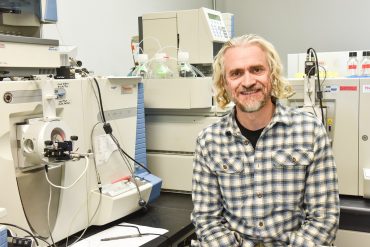
Feb. 23, 2021
ACCase: The Gatekeeper of Plant Oil
Jay Thelen sitting amongst Liquid Chromatography-Tandem Mass Spectrometers in the lab. | photo by Becca Wolf, Bond LSC By Becca Wolf | Bond LSC Two decades ago Jay Thelen speculated an unknown protein anchored acetyl-CoA carboxylase (ACCase), an important enzyme complex, to the chloroplast membrane. He even published a paper about it, not knowing exactly what the membrane protein was. Flash forward and Thelen, a professor of biochemistry and principal investigator at Bond Life Sciences Center, now knows exactly what it is, which is detailed in a recent paper in Nature Communications. And this finding could potentially…
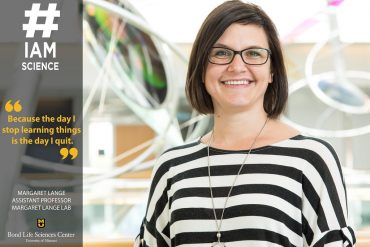
Feb. 19, 2021
#IAmScience Margaret Lange
By Lauren Hines | Bond LSC Building a community through screens and limited interaction can be difficult. However, it’s no problem for Margaret Lange at Bond Life Sciences Center. “I’ve met such wonderful people,” Lange said. “It really is true that if you surround yourself with the right kind of people who are positive, who think creatively and who ask good questions, it shows you how to model that behavior yourself. It teaches you to be better and helps you think better.” Lange was originally part of the Donald Burke lab until she became an assistant professor…
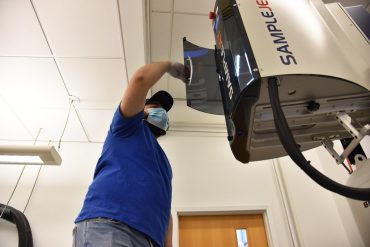
Feb. 16, 2021
From Sample to Source
Metabolite screening looks to better understand cancer Research scientist Rajarshi Ghosh in the Lloyd W. Sumner lab loads samples into the Nuclear Magnetic Resonance (MNR) spectrometer for analysis. | Photo by Lauren Hines, Bond LSC. By Lauren Hines | Bond LSC Doctors take blood or urine samples to see what’s going on in the body of a patient, and that’s not all that different from what metabolomics scientists do when looking at metabolites. “[The doctor] may profile 20 or 30 compounds to try to understand what’s going on with your physical health and well-being,” said Lloyd…
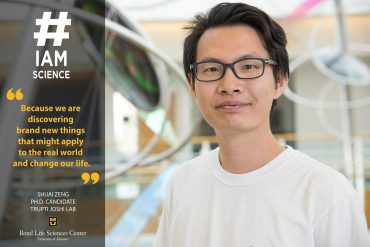
Feb. 12, 2021
#IAmScience Shuai Zeng
By Becca Wolf | Bond LSC It’s not a straight line between basic research and Silicon Valley, but Shuai Zeng made the dots connect. Last summer, Zeng, a Ph.D. candidate in computer science, had an internship at Google headquarters in Mountain View City, California, where he worked on an applied research team. There, he helped design and develop a state-of-the-art deep learning model about video recommendations for Google Ads and YouTube. Deep learning mimics the workings of the human brain in processing data through artificial intelligence (AI). It is used in detecting objects, recognizing speech, translating languages, and…